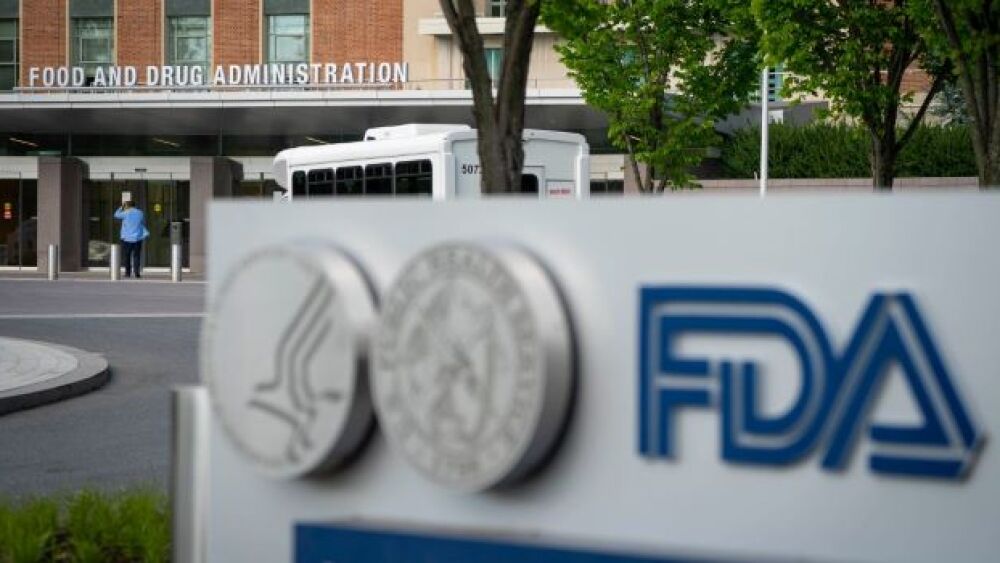The approval, which was made under Priority Review, is a watershed moment in gene therapy as it marks the first FDA green light for a lentiviral vector.
Sarah Silbiger/Getty Images
Following overwhelming support from an advisory committee, the FDA approved bluebird bio’s gene therapy for beta-thalassemia on Wednesday.
The therapy, previously known as beti-cel (betibeglogene autotemcel), will be marketed under the brand name Zynteglo, the same name for which it is sold in Europe. The approval, which was made under Priority Review, is a watershed moment in gene therapy as it marks the first FDA green light for a lentiviral vector.
Andrew Obenshain, CEO of bluebird, said the approval of the first ex-vivo lentiviral vector gene therapy in the U.S. has the potential to change the treatment paradigms for diseases that “currently carry a lifelong burden of care.” Specifically, Zynteglo was approved as a one-time gene therapy aimed at the underlying genetic cause of beta‑thalassemia in adult and pediatric patients who require regular red blood cell (RBC) transfusions.
Obenshain added that the approval will provide these patients with “freedom from burdensome regular red blood cell transfusions and iron chelation” and unlock new possibilities in their daily lives.
The approval for beti-cel came a little more than two months after an FDA advisory committee unanimously backed the gene therapy. The members of the committee voted 13-0 in support of the question, “Do the benefits of beti-cel outweigh the risks for the treatment of subjects with transfusion-dependent beta-thalassemia?”
Beta-thalassemia is a rare, genetic blood disease caused by mutations in the beta-globin gene. The disease is characterized by significantly reduced or absent adult hemoglobin production and many of the people diagnosed with this disease are transfusion dependent, a process that typically occurs every two to five weeks.
Alexis A. Thompson, chief of the division of hematology at the Children’s Hospital of Philadelphia and one of the clinical investigators for Zynteglo, said transfusion-dependent beta-thalassemia is “associated with an intense treatment burden and significant health risks related to regular red blood transfusions and iron management.” Thompson added that she celebrates the therapeutic potential of the gene therapy for these patients.
Zynteglo works by adding functional copies of a modified form of the beta-globin gene into a patient’s blood stem cells. This allows them to make normal to near normal levels of total hemoglobin without the need for regular red blood cell transfusions. The functional gene is added into a patient’s cells outside of the body and then infused into the patient.
“We’re extremely excited about the approval of Zynteglo,” Tom Klima, chief commercial and operating officer of bluebird bio told BioSpace in an email. “This is an incredible moment for patients with transfusion-dependent beta-thalassemia and their families who currently depend on regular red blood cell transfusions to survive and represents an opportunity to transform the treatment paradigm for this disease.”
Klima added that “it also marks a significant milestone for bluebird as we transition to a commercial stage gene therapy company in the U.S.”
Approval of beti-cel was based on positive data from multiple Phase III studies that found 89% of patients who could be evaluated achieved transfusion independence. The results of the study have so far proven to be durable, bluebird reported. Patients who received the gene therapy have continued to be monitored by the company.
“Across all studies, all patients who achieved transfusion independence have remained transfusion-free,” the company stated.
It is estimated that there are approximately 1,300-1,500 individuals with transfusion-dependent beta-thalassemia in the United States. The treatment will be administered to patients at preselected locations based on their experience with stem cell transplantation, cell and gene therapy and beta-thalassemia, bluebird stated.
Although bluebird did not mention the potential price tag for Zynteglo, Reuters reported that it could be set at about $2.8 million. This would surpass Novartis’ spinal muscular atrophy gene therapy Zolgensma, which carries a cost of about $2.1 million, as the most expensive treatment on the market.
Bluebird could soon see approval for another lentiviral-based gene therapy. The FDA is weighing the potential approval of eli-cel, a one-time therapy for the treatment of early active cerebral adrenoleukodystrophy (CALD) in pediatric patients who are not eligible for stem cell transplant from a matching donor.
CALD is a rare and serious neurological disorder caused by mutations in the ABCD1 gene. The x-linked disorder is ultimately fatal, but not before sending the patient into a vegetative state.
There are no FDA-approved therapies for CALD. Eli-cel has already been approved in Europe for this indication. It is marketed under the brand name Skysona.
The same FDA advisory committee that poured over beti-cel’s developmental history also examined eli-cel, a therapy that has been hampered with some safety concerns. The committee members unanimously backed its efficacy in CALD patients who are not eligible for stem cell transplant from a matching donor. The PDUFA date for eli-cel is Sept. 16.





